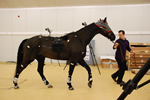Search - All Results
1571 - 1580 of 1666 results
-
LBIC is awarded ‘Outstanding Contribution to Life Sciences’ at the One Nucleus Annual Awards 2025
The RVC are delighted to see the London BioScience Innovation Centre (LBIC) honoured as the recipient of this years ‘Outstanding Contribution to Life Sciences’ award, received at The One Nucleus Annual Awards 2025 on Tuesday 27th March 2025. Held … -
The RVC to offer minimally invasive surgical procedure for horses suffering from cervical spinal nerve compression
The Royal Veterinary College (RVC) has announced the expansion of its Equine Referral Hospital services to include a pioneering surgical procedure for horses with cervical spinal nerve compression. From 1st August 2025, the introduction of uniportal … -
RVC research team is one step closer to objective detection of horses with ataxia
Researchers at the Royal Veterinary College have developed a method of objective evaluation that can help differentiate horses with ataxia, a neurological disorder resulting in an uncoordinated or drunken gait, from those with other mobility issues. -
Help With Your Studies
The Royal Veterinary College's Education Development Team works to help students achieve their academic goals effectively, efficiently and with maximum enjoyment. -
How to Apply
UCAS Applications for the BSc Biological Sciences and BSc Bioveterinary Sciences with a Certificate in Work-based Learning and Research programme are made by visiting UCAS online. The course code for BSc Biological Sciences with a Certificate in … -
How to Apply
UCAS To apply for the BSc Bioveterinary Sciences programme please visit UCAS online. The course code for the programme is D300 and the institution code for the RVC is RVET R84. Deadline: 15 January for September entry. We may still be able to … -
IFSTAL launch and documentary film screening of "The Scottish Breed"
IFSTAL is a collaboration between five higher education institutions: The University of Oxford, LCIRAH (comprising The Royal Veterinary College (RVC), The London School of Hygiene and Tropical Medicine, School of Oriental and African Studies) and …IFSTAL is a collaboration between five higher education institutions: The University of Oxford, …
-
Extracorporeal Therapies (Dialysis and Plasmapheresis)
The Royal Veterinary College's small animal referral hospital is the first veterinary hospital in the UK to offer advanced extracorporeal therapies, including dialysis and plasmapheresis (therapeutic plasma exchange). These are pioneering blood purification treatments that are used in both dogs and cats with kidney failure, immune mediated disease and toxicities. -
Fact File
Keratoconjuncitivitis sicca (dry eye)
Low tear production is the most common form of dry eye in dogs
-
Fact File
Corneal ulcers
There are several reasons why corneal ulcers appear. Most ulcers in dogs and cats are the result of trauma




